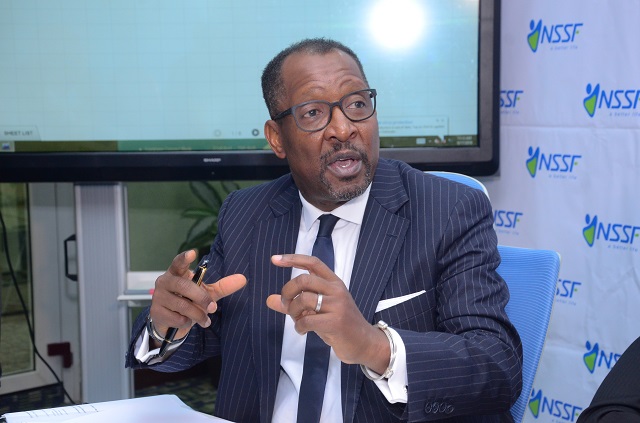
Kampala, Uganda | THE INDEPENDENT | The Managing Director of the National Social Security Fund (NSSF), Richard Byarugaba has warned of the likelihood of the collapse of the fund if the suggestion that it pays 20 percent to each saver is approved.
In a ‘passionate’ four-page letter to the Minister of Finance Matia Kasaija, Byarugaba said “the proposal not only ruins the NSSF but also has wider negative implications for the economy and society. The Fund which has taken time to rebuild could collapse.”
The letter though doesn’t tell exactly how the fund will collapse by releasing 20 percent to savers.
The coronavirus crisis has seen businesses shut, many workers either laid off or had pay cuts. Many are struggling to survive, giving rise to suggestion on whether they can draw on their pension savings in NSSF.
The issue is in parliament and will likely be approved. However, it has divided the country with some people arguing that NSSF money is for retirement and not emergencies.
In the letter which is dated May 5, 2020, Byarugaba says the fund will have to pay at least 2.6 trillion Shillings to those who might need their pay to go through the COVID-19 crisis. This is in addition to the 1.1 trillion that it might need to pay to those who have reached 55-years old, the legal age where one can draw their savings. In total, the fund will need cash totaling 3.7 trillion Shillings for this moment.
But there is no ready cash to meet this obligation, Byarugaba argued. He said the fund would have to sell its treasury bonds to meet benefits payments. Byarugaba argues that the fund is the biggest holder (over 5 percent) and buyer of the government of Uganda bonds.
If turned into a net seller – in order to raise the 3.7 trillion Shillings to pay out – the NSSF would not be able to invest in new government bonds. NSSF assets are at 13 trillion invested in Kenya, Uganda, Tanzania and Rwanda.
Consequently, he said, “government would struggle to raise funds in its treasury actions to fund its programs. The muted demand for primary auctions would dramatically result in higher interest rates.”
He added that “the fund would struggle to find buyers in the secondary market unless the securities are heavily discounted and turmoil would arrive in the marketplace.” Also, because of the money, it would be required to pay out, its ongoing real estate projects would have to be halted and NSSF would default on contracts. This will attract legal suits.
NSSF has 2.3 million members at the moment. However, close to a half (1m people) have less than 10 million on their accounts. Some 7 percent (161,000) people have balances above 50 million an indicator that only a paltry of savers have sizeable savings. Also, this is a testimony that many members of NSSF don’t earn a lot and therefore most vulnerable to shocks like the coronavirus pandemic – in this case, retirement becomes secondary to survival.
But Byarugaba throws in a spanner saying agitation for mid-term access is not a new thing and that “the pandemic has strengthened an already existing plea by members for mid-term access to their savings.”
This can be allowed if parliament can amend the law and introduce new benefits relating to unemployment, medical, housing and education. But he said additional savings from members beyond the standard 15 percent contributions are needed to meet that.
Dr Ezra Munyambonera, an economist and researcher on pension at the Makerere University-based think tank, EPRC, says social security means retirement and should not be substituted for emergencies.
He said it falls squarely on the government to take care of all the vulnerable people in this period. He suggested things like cutting Pay As You Earn (PAYE) can give workers the needed reprieve. Whatever way it turns out, the pandemic might leave members’ confidence in the fund battered – its ability to help its members in times of crisis is facing the starkest test.
*******
URN
 The Independent Uganda: You get the Truth we Pay the Price
The Independent Uganda: You get the Truth we Pay the Price


